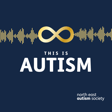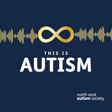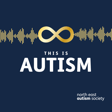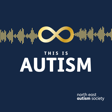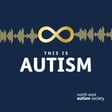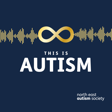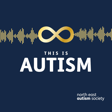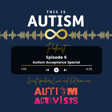Become a Creator today!Start creating today - Share your story with the world!
Start for free
00:00:00
00:00:01

11. Employment
Just 1 in 5 autistic people are in employment - the worst rate of any disability group.
Ashley Jones, Business Analyst for the North East Autism Society shares his experience of being diagnosed autistic, finding employment, supporting employers and helping others find their dream jobs.
Episode breakdown:
1:50 Diagnosis
3.55 What does autism mean to you
7:55 Masking
9.28 Barriers to employment
11:00 Reasonable adjustments in the workplace
13.40 Positive disclosure
14:45 Common misconceptions
16:44 How can we make employment better
Transcript
Introduction to Podcast & Employment Challenges
00:00:06
Speaker
So there's a lot of misunderstanding about autism as well. A constant battle within my own mind. You just need to start from a place of kindness, just be nice.
00:00:19
Speaker
On a day-to-day basis when I'm interacting with people, especially people i don't want know, there's quite a high level of anxiety. There's a lot more work needs to be done. Hello and welcome to This Is Autism, the podcast from the Northeast Autism Society. My name is Kerry Highcock and I'm the Family Development Manager at the charity.
00:00:36
Speaker
Employment is a big issue for the neurodivergent community. Only three in ten autistic people are in employment and one-size-fits-all hiring practices. but Lack of support at work can be a huge barrier to people.
00:00:48
Speaker
One person who knows all about this is Ashley Jones. After a variety of jobs, Ashley joined a scheme run by the Northeast Autism Society to help neurodivergent people into work.
00:00:59
Speaker
He ended up coming to work for the charity and is now the deputy manager of our Employment Futures Service, helping hundreds of others like him into work or training. So thanks for joining us,
Ashley's Diagnostic Journey
00:01:09
Speaker
Ashley, today. You're welcome. It's ah lovely to have you. Can you just tell us a little bit ah about yourself, Ashley, before we start? What job do you do at North East Autism Society?
00:01:18
Speaker
i am Well, I'm about to change roles, actually. um But I started at the society eight years ago. um It was on a provision called the LA7 provision. Okay.
00:01:29
Speaker
Derek Groves who's the services manager gave me a space on that provision after attending it for a few weeks he then offered me ah job at NIAS and I've been here ever since brilliant so Ashley when did you um get your official autism diagnosis how old were you I'd have been 24, I believe.
00:01:53
Speaker
And what was that what was that journey like for you? I mean, how did you come to the conclusion that, you know, you might be autistic? I had no idea. um ah had a bereavement in the family and I went to seek mental health support.
00:02:09
Speaker
And whilst receiving that support, ah I was advised that I'd been um put forward for the diagnosis for autism.
00:02:20
Speaker
At the time, they diagnosed me with Asperger's, which is isn't used anymore. But at the time, that was um the diagnosis that was kind of given out. um ah So ah for six months I was observed whilst doing um DBT therapy, CBT therapy, so a psychologist, psychiatrist, I had a CPN.
00:02:42
Speaker
um Over that time i spoke to a speech and language therapist. There was six different um health professionals who had to unanimously decide that that was the diagnosis.
00:02:54
Speaker
And then after those six months I was given an autism report which I submitted to NIAS when I first started working with them. It's about 20
Living with Autism: Daily Struggles
00:03:01
Speaker
pages, goes into details about my diagnosis, um how it affects me on a day-to-day basis.
00:03:06
Speaker
I think a pertinent point to make right now is that that no longer happens. People are very lucky if they get an hour in front of someone and they don't really get given support after the diagnosis either.
00:03:22
Speaker
um Certainly the people that we support don't come in with autism reports. They just come in with a piece of paper saying they've spoken to somebody and they've been given a diagnosis. Yeah, absolutely. Yeah. ah You know, I completely agree that there's a lot more work needs to be done out there, doesn't it? ah And I think, yeah, a lot of people aren't getting access to that post-diagnostic support either, particularly adults. So it's really, really hard.
00:03:45
Speaker
So what, and I mean, this is a very big question, I guess, Ashley, but what does being autistic mean to you? It means many things on many different days.
00:03:57
Speaker
um In a work context, it's a constant battle. I think it's difficult to explain, but every conversation, every word is analyzed.
00:04:13
Speaker
I can't read facial expressions or body language, so my interpretation of language comes through the spoken word. So my speech can sometimes be quite unfiltered and blunt to the point, which means that on a day-to-day basis when I'm interacting with people, especially people I don't know, there's quite a high level of anxiety.
00:04:35
Speaker
So autism in a work context can mean anxiety. um a constant battle within my own mind. Sometimes I perceive things that aren't there because but of how analytical my thinking is.
00:04:51
Speaker
Sometimes I become monotropic and focus on certain things to the detriment of, say, a bigger picture. Other times, um those type of ways of thinking are of benefit.
00:05:06
Speaker
to the job that I do and actually mean that I can interact with people in a different way that perhaps might give a different insight. But for me personally,
00:05:17
Speaker
um most of the time, it's a struggle because your mind never stops. It never shuts off.
00:05:28
Speaker
There isn't a moment
Societal Misunderstandings & Masking
00:05:29
Speaker
of peace ah for me personally. I'm not speaking for everyone in the community, but um from a young age, you kind of adapt and then come to believe that the way in which you perceive the world and the way in which you're interacting with people is the norm until you get a diagnosis and then you realize it isn't. So I've had a lot of um therapy in my life.
00:06:00
Speaker
ah Like I mentioned earlier, CBT, ah DBT, which was more helpful, which is dialectical behavioral therapy, which kind of breaks down actions and thoughts and things, which I found more useful.
00:06:12
Speaker
um But I've also had PTSD therapy, therapy for trauma. I think what isn't understood is that Growing up, if you don't have a sense of the world around you or self or how to communicate or how to interact in a social situation, say for instance, in a particular way, um it can be incredibly isolating and stressful.
00:06:48
Speaker
And the other thing is people don't tend to to realize that that's your entire life. That's not just your childhood. you might adapt, you might find ways of coping, you might find strategies that work for you, but you never gain the abilities that you never had.
00:07:06
Speaker
You never get to a point where it is just okay every day, like it's manageable. But then on the other side of that, there's a lot of stigma around autism.
00:07:20
Speaker
um you know I have had questions about ah How is it that you're in a position of responsibility if you're autistic? You know, how could you manage other people if you can't even read facial expressions?
00:07:34
Speaker
how could How could you have a position where you're responsible for other people's livelihoods if you struggle within your own environment? So there's a lot of misunderstanding about autism as well.
00:07:48
Speaker
Yeah, and I think that then reflects back to masking, isn't it, Ashley? So, you know, masking is not just about wanting or needing to fit in socially. It's actually a survival strategy to keep yourself safe from stigma.
00:08:02
Speaker
Yeah, and the masking is a huge amount of energy. So you might think of physical energy if someone's got a physical job and you know maybe they're roofing like the fellas who were on the roof at the minute and they are, that's a physical job. They might go home and they might be tired at the end of the day because they've done a ah hard shift.
00:08:22
Speaker
um For a lot of autistic people, that ah Ability to blend in, that ability to feel like you can participate, say, in a conversation or in a social context, takes a lot of mental energy.
00:08:41
Speaker
So you know you you become very tired very quickly if your environment that you're in, especially in a work environment, if the reasonable adjustments haven't been made.
00:08:53
Speaker
And that's a very important point. you know The law's there for a reason. um And it is hidden in many respects. It's not something that, you know, if you were to meet an autistic person, they're not wearing a badge.
00:09:05
Speaker
the not There's not something that would indicate that they are dealing with a sensory input issue. You know, it's incumbent upon the employer and the the the people that work there to kind of make those adjustments for autistic people.
00:09:20
Speaker
So what do
Barriers to Employment for Autistic People
00:09:21
Speaker
what do you think are some of the barriers, Ashley, to employment for autistic people? The biggest one. is ah lack of understanding.
00:09:32
Speaker
Now, 99.9% of people are, you know, considerate, kind people. ah you know consider it kind people But if you don't have the knowledge, if you don't understand, then anything that you come to do or change won't be based on something that's effectual.
00:09:52
Speaker
It will be based on something that you've maybe read in the newspaper or seen in a film or seen in media. Because the way that autism's portrayed mainstream versus how it affects someone on day-to-day basis is vastly different.
00:10:06
Speaker
because no two people are exactly the same. So the biggest barrier is getting over the fear of asking somebody, how does this affect you?
00:10:17
Speaker
How could we possibly make this environment better for you to be in? Because let's be honest, if you're an employer or you work ah in ah in a space where there are people who are maybe neurodivergent, it's not an easy conversation to have to walk up to somebody and say, I'm Ashley. I just wanted to ask you, is there anything that we can do to help you feel better?
00:10:40
Speaker
But having that knowledge and having that understanding, which is where NIAS do a great job of supporting people, facilitate those type of conversations yeah and you mentioned actually um a few times which is something we wanted to talk about reasonable adjustments so just for people listening that might not know about that term what does reasonable adjustments mean what what are they all about so there's an act uh called the equality act of 2010 which has nine protected characteristics within it um an underemployment law um
00:11:15
Speaker
you have the right to be not discriminated against, but also to be treated equally, hence the Equality Act. um Autism falls under disability um under the Act.
00:11:28
Speaker
And it means that in a work environment, you have the right to access that work environment and be part of that work environment, the same as anybody else would. So for me, as an example,
00:11:41
Speaker
I can be become overstimulated because I'm
Workplace Disclosure: Risks and Advice
00:11:45
Speaker
hypersensitive to heat. So I wear skin-tight clothing because it feels good, but it also helps me regulate my heat.
00:11:54
Speaker
I also can become overstimulated to too much ah sound and light. So if there's strip light and say, for instance, I can't work in the office five days a week, I've got to be out of the office a certain amount of time because it it becomes too much to bear.
00:12:11
Speaker
um So NIAS as an organization sat down with me, went through my autism report and said, how can we support you? What reasonable adjustments can we make so that you can access the buildings that you're in, the team that you work with in the same way that everybody else on your team can?
00:12:30
Speaker
And it was a two-way conversation. It was a discussion around what I needed, but also what was feasible and reasonable for the business to do. Because it's not always, I would like this and we can do that. it's a It's a discussion, two-way conversation.
00:12:47
Speaker
I think what we'll do, Ashley, is we'll just take a little break and then we're going to come back in a moment and have a bit more of a chat about this, if that's all okay. Yeah.
00:12:57
Speaker
Hi, while we're on a quick break, I thought I'd tell you a little bit more about the Family Development Service here at the North East Autism Society. The Family Development Services provides support for families pre, during and after diagnosis and includes a variety of services, including our parent and toddler groups, autism hubs, workshops for families, a dedicated en inquiry line and our resource site as well, which can be found ne-as.org.uk and go along to the Family Development site. You can find all the information there.
00:13:28
Speaker
Welcome back to This Is Autism. We're discussing employment and some of the barriers autistic people face finding employment with Ashley Jones. So Ashley, and we were just going to start talking about disclosure. So in terms of, you know, autistic people telling their employer that they're autistic, do you think that's a useful thing? Do you think it has challenges?
00:13:49
Speaker
ah It can be a useful thing, but not always. i think what we've got to do is ground all of our conversations in reality. And the reality is that not all businesses follow the law and not all businesses neuro-inclusive.
00:14:04
Speaker
So it really depends on your situation and circumstance. If you're applying for a job and you're at the beginning stages, it might be that if the company's disability confident and you disclose that you're guaranteed an interview and they might be open to be having those discussions before um ah job offer is made.
00:14:24
Speaker
On the other hand, you might be working, say, in a service industry with a small business and you might disclose that and they might have another 100 applicants. It's against the
Autism Misconceptions
00:14:33
Speaker
law to filter you out.
00:14:34
Speaker
but they might. So it really depends upon your circumstance. What I would recommend people do if if they have any kind of concerns is to to contact somebody and have that discussion.
00:14:46
Speaker
Yeah, definitely. Are there any common misconceptions present when you're working with employers? Yeah, the number one is that it's a mental health thing and it isn't.
00:14:57
Speaker
um It's a neurological disorder, autism. um It's not anything to do with mental health.
00:15:09
Speaker
Mental health is a co-occurring condition. You might really suffer badly with anxiety and depression, but it doesn't fall under the same umbrella. Time and time again, we've got employers who say,
00:15:21
Speaker
um you know We couldn't accommodate this person because we have lots of other people who might want to be off long-term sick for X, Y, and zd which is ridiculous.
00:15:32
Speaker
um It just goes to show the level of misunderstanding that there is sometimes. Another really big misconception is that people's ability is impaired somehow because of a diagnosis, which again is ridiculous to think. Um, there are plenty of examples in society today of autistic people running billion dollar companies.
00:15:56
Speaker
It isn't something that would eliminate, eliminate somebody from a specific job. Um, But then again, not always is there their understanding that autism is kind of on a spectrum as well.
00:16:12
Speaker
you know And what what one person might find difficult, someone else actually excels in. So if you don't have that conversation, if you don't you know explore the individual, then you're never going to know that.
00:16:27
Speaker
So if you had a magic wand, Ashley, which I don't have, um but what what would be some of
Changing Employment Practices for Inclusivity
00:16:33
Speaker
the key elements that would make employment better, do you think, for autistic people? I know you've spoke a lot about increasing understanding is key, absolutely, but is there anything else that could make employment better?
00:16:46
Speaker
Yeah, I think let's get away from the you know industrial model of employment. you know um The nine to five, the Monday to Friday, the um psychometric testing, the interviews.
00:17:04
Speaker
We are in a world at the moment where There aren't enough people to fill the jobs that currently exist in this country. So what excuse do people have to not change the way that they practice business slightly to accommodate more people?
00:17:20
Speaker
you know Do we really need an interview face-to-face with somebody in this modern era? Can we not have them come in, assign them a task that they could possibly do, and then evaluate them on how they completed that task rather than you know a set task?
00:17:37
Speaker
number of interview questions. um The amount of times that we've had people not apply because the job spec or the job description is rubbish.
00:17:48
Speaker
It doesn't actually say what the job is or what you'd actually be doing. So you'll get someone who's neurodivergent who'll read that and say, well, I don't do that. I don't do that. I don't have this.
00:17:59
Speaker
I don't have that. But in actual fact, if it was more clear and concise that you turn up on Monday, there's these things that you need to file. You answer the phone and you respond to these emails instead of an administrative CV that's being pulled off the internet that doesn't actually really relate to the job.
00:18:17
Speaker
That would help people a lot more as well. I think um communication is key to how you understand a person and how you interact with them and how well they might be able to do a job. but So using less technical terms or acronyms or...
00:18:41
Speaker
things that are maybe related to your sector or business, but aren't really related to to what people talk about every day, day to day. I think another thing that autistic people really um struggle with is insincerity and um the way that people sometimes look to find out if you're a good person by chatting about something that they themselves might find interesting.
00:19:10
Speaker
Typical ones is you know the weather or football or whatever it is that that person particularly follows. You can't really gauge your person on those type of things. And if you're talking to someone who's perhaps neurodivergent, there are other things to consider in the way in which they respond.
00:19:28
Speaker
So say, for instance, if I'm interviewing somebody with ADHD, i am I might say something and they might echo back to me the thing that I've said. And that's not because they don't know what to to say or what to think.
00:19:44
Speaker
It's because a lot of people with ADHD will show that they've understood by relating information back that the person's first said to them. It's common trait.
00:19:56
Speaker
But
Advocating for Societal Change with Kindness
00:19:57
Speaker
if you don't have that knowledge, you would assume that the person doesn't know what they're talking about because they're just parroting things back to you. um So those are the type of things that I would, for a start, ah focus on.
00:20:09
Speaker
And again, Ashley, this is another huge question. and But in terms of society, you know, the wider society, if we think really big, think much bigger here, What do we need to do better in regards to employment for those of us who are neurodivergent?
00:20:27
Speaker
I don't think as a society we're at a point where we treat the most vulnerable in society with the most amount of respect that they deserve. I think everything starts with kindness.
00:20:40
Speaker
If you have good intention, and you think about doing something for someone because it's the right thing to do, then you can't go far wrong. If within your mind, you give the best interpretation you possibly can to every person in every situation, you're less likely to filter out people who maybe don't have the same abilities to ah communicate and react to you in a way that somebody else might. So I think
00:21:14
Speaker
Start from a place of kindness, give everybody the best interpretation possible that you can. And then if there is any question within your mind, show the person across from you the respect that they deserve and ask them.
00:21:30
Speaker
Never, ever assume, always ask. Yeah, because everybody has a story. And I completely agree with what you just said there, Ashley, about kindness. That's one of my go-tos is hashtag just be kind. you know what We don't need huge training courses or degrees or and anything like that. We just need to start from a place of kindness. Just be nice.
00:21:55
Speaker
you know Absolutely, yeah. I completely get that. Ashley, thanks for being a guest today and to our listeners, thank you also. If you'd like to read more about our Employment Futures service or get in touch, please go to www.ne-as.org.uk forward slash employment futures.
00:22:13
Speaker
You can also follow the Northeast Autism Society on Facebook, Twitter, Instagram or LinkedIn. The podcast This Is Autism comes out each month. You can subscribe on Apple Podcasts, Google or Spotify so you never miss an episode.
00:22:27
Speaker
Bye for now.
